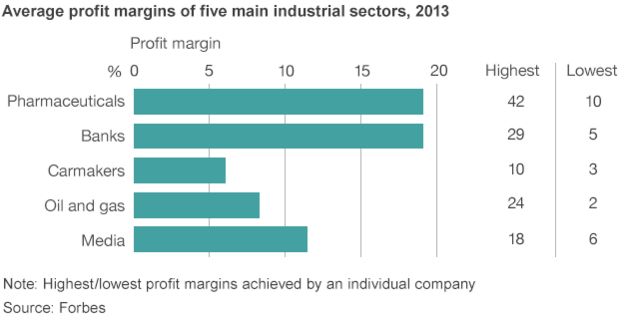Pharmaceutical industry gets high on fat profits - BBC News
►https://www.bbc.com/news/business-28212223
Last year, US giant Pfizer, the world’s largest drug company by pharmaceutical revenue, made an eye-watering 42% profit margin. As one industry veteran understandably says: “I wouldn’t be able to justify [those kinds of margins].”
Stripping out the one-off $10bn (£6.2bn) the company made from spinning off its animal health business leaves a margin of 24%, still pretty spectacular by any standard.
In the UK, for example, there was widespread anger when the industry regulator predicted energy companies’ profit margins would grow from 4% to 8% this year.
 https://ichef.bbci.co.uk/news/624/media/images/78427000/gif/_78427037_pharmaceutical_profits_624.gif
https://ichef.bbci.co.uk/news/624/media/images/78427000/gif/_78427037_pharmaceutical_profits_624.gif Last year, five pharmaceutical companies made a profit margin of 20% or more - Pfizer, Hoffmann-La Roche, AbbVie, GlaxoSmithKline (GSK) and Eli Lilly.
Drug companies justify the high prices they charge by arguing that their research and development (R&D) costs are huge. On average, only three in 10 drugs launched are profitable, with one of those going on to be a blockbuster with $1bn-plus revenues a year. Many more do not even make it to market.
But as the table below shows, drug companies spend far more on marketing drugs - in some cases twice as much - than on developing them. And besides, profit margins take into account R&D costs.
The industry also argues that the wider value of the drug needs to be considered.
“Drugs do save money over the longer term,” says Stephen Whitehead, chief executive of the Association of the British Pharmaceuticals Industry (ABPI).
"Take hepatitis C, a shocking virus that kills people and used to require a liver transplant. At £35,000 [to £70,000] for a 12-week course, 90% of people are now cured, will never need surgery or looking after, and can continue to support their families.
“The amount of money saved is huge.”
Pour les opioides, c’est le contraire... les coûts sociaux sont largement plus importants que les revenus des entreprises pharmaceutiques concernées.
Courting doctors
But drug companies have been accused of, and admitted to, far worse.
Until recently, paying bribes to doctors to prescribe their drugs was commonplace at big pharmas, although the practice is now generally frowned upon and illegal in many places. GSK was fined $490m in China in September for bribery and has been accused of similar practices in Poland and the Middle East.
The rules on gifts, educational grants and sponsoring lectures, for example, are less clear cut, and these practices remain commonplace in the US.
Indeed a recent study found that doctors in the US receiving payments from pharma companies were twice as likely to prescribe their drugs.
’Undue influence’
No wonder, then, that the World Health Organisation (WHO) has talked of the “inherent conflict” between the legitimate business goals of the drug companies and the medical and social needs of the wider public.
Indeed the Council of Europe is launching an investigation into “protecting patients and public health against the undue influence of the pharmaceutical industry”.
It will look at “particular practices such as sponsoring health professionals by the industry... or recourse by public health institutions to the knowledge of highly specialised researchers on the pay-rolls of industry”.


